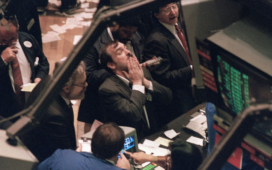Stock market crash: The Indian stock market has been reeling under selling pressure lately amid relentless foreign capital outflows, concerns over weak earnings, slowing economic growth, and the domestic currency plunging to all-time lows against the dollar. The market benchmark Sensex has crashed over 2,400 points in the last five days, while the Nifty 50 has fallen below 23,050.
On Tuesday, February 11, the Sensex opened at 77,384.98 against its previous close of 77,311.80 and dropped 1,139 points to 76,173.08 during the session. The Nifty 50 opened at 23,383.55 against its previous close of 23,381.60 and fell 359 points, or 1.54 per cent, to 23,022.45.
Underperforming the benchmarks, the BSE Midcap and Smallcap indices crashed over 3 per cent each during the session.
Including Tuesday’s fall, the Sensex has crashed 2,411 points, while the Nifty 50 has lost 717 points or 3 per cent in the last five days.
Investors have lost nearly ₹18 lakh crore in the last five days as the overall market capitalisation of BSE-listed firms has dropped to nearly ₹408 lakh crore from ₹426 lakh crore on February 4 when the Sensex ended in the green last time.
Around 1:20 PM, the Sensex was 966 points, or 1.25 per cent, down at 76,346, while the Nifty 50 was 294 points, or 1.26 per cent, down at 23,087.
Why is Indian stock market falling?
According to experts, there are five key reasons weighing on stock market sentiment. Let’s take a look:
1. Massive FPI selling
Foreign investors have been selling Indian stocks since October last year amid rising US bond yields and a stronger dollar, driven by fading prospects of a Fed rate cut anytime soon.
Till February 10, foreign institutional investors (FIIs) have sold Indian stocks worth ₹12,643 crore in the cash segment. Since October, they have taken out over ₹2.75 lakh crore from the Indian stock market.
2. Weak Q3 earnings
Even though the December quarter (Q3) earnings of India Inc. have been marginally better than the last two quarters, they have failed to meet expectations, raising concerns that several stocks were moving above their fundamentals.
“Q3 earnings have been marginally better than the last two quarters, which were marred by a significant decline in govt capex, elections and weather. However, compared to expectations as indicated by valuations, earnings continue to disappoint. Consumer staples, autos, and building materials are notable disappointments, while speciality chemicals seem to recover smartly,” Pramod Gubbi, co-founder of Marcellus Investment Managers, told Mint.
3. Rupee’s weakness
The rupee’s weakness against the US dollar has been among the key factors behind the aggressive foreign capital outflow and weak market sentiment. The domestic currency fell closer to 88-level on Monday, falling nearly 3 per cent against the dollar this year.
The recent sharp fall in the rupee could be attributed to the dollar’s rise amid concerns over a trade war which could cause a prolonged economic disruption.
On Tuesday, the rupee gained 61 paise to 86.84 against the US dollar in early trade amid speculations of an intervention by the Reserve Bank of India.
4. Stretched valuation remains a key concern
Experts believe the Indian stock market is still expensive despite the recent correction, and the weak expectations of earnings recovery are keeping sentiment low.
“Valuations remain elevated, and earnings aren’t likely to recover anytime soon,” said Gubbi.
According to V K Vijayakumar, Chief Investment Strategist at Geojit Financial Services, the relentless selling by FIIs in large-caps has made their valuations fair while the valuations of mid and small-caps continue to be excessive.
Valuation guru Aswath Damodaran believes the Indian stock market is the most expensive equity market in the world, and no amount of “handwaving” can justify its valuation.
5. Fears of a trade war
US President Donald Trump has announced several tariffs against trade partners, aggravating concerns about a broader trade war that could derail global economic growth and drive up inflation.
On Monday, Trump imposed a 25 per cent tariff on steel and aluminium imports which is expected to impact Canada and Mexico most.
Uncertainty over the US tariffs and their consequence on global economic growth have kept investors cautious about riskier equities.
“What is different with the current US administration is the absence of policy certainty. And that is the risk that investors will have to live with. The next 4 years are going to be a volatile but exciting time for public market investors,” said Varun Fatehpuria, Founder & CEO, Daulat Finvest Private Limited.
Read all market-related news here
Read more stories by Nishant Kumar
Disclaimer: The views and recommendations above are those of individual analysts, experts, and brokerage firms, not Mint. We advise investors to consult certified experts before making any investment decisions.
Catch all the Business News , Market News , Breaking News Events and Latest News Updates on Live Mint. Download The Mint News App to get Daily Market Updates.
MoreLess




